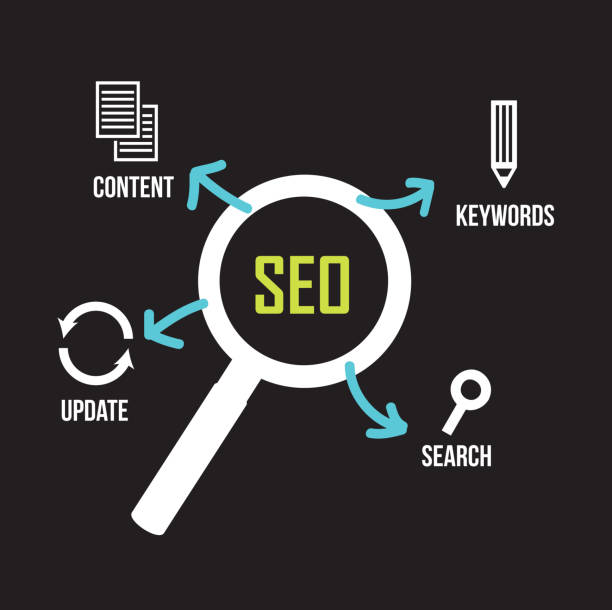Introduction to SEO and its Importance in Today’s World

In today’s #digital marketing world, SEO or Search Engine Optimization is no longer a luxury option, but a vital necessity for any business that wants to be seen in the online space.
Imagine your website is a beautiful shop window on a quiet street; without SEO, search engines like Google, Bing, and Yahoo cannot introduce it to your potential customers.
This #educational process involves a set of actions and techniques that help your website achieve a higher ranking in search results and ultimately attract more organic traffic.
The importance of SEO is not limited to increasing visits; it also significantly helps in enhancing brand credibility, improving user experience, and ultimately boosting sales and revenue.
The main goal of SEO is for your website to appear on the first page of search results for keywords relevant to your business, as most users do not check beyond the first page.
Undoubtedly, investing in SEO is a long-term investment that will bring sustainable and valuable results.
In this article, we will comprehensively and explanatorily cover various aspects of SEO.
Did you know that 94% of a first impression of a company is related to its website design?
RasaWeb, by offering professional corporate website design services, helps you create the best first impression.
✅ Create a professional and trustworthy image for your brand
✅ Easier attraction of potential customers and improvement of online presence
⚡ Get free corporate website design consultation now!
Basic Principles of On-Page SEO and Content Optimization

The On-Page SEO section refers to all actions you take directly on your website pages to improve its ranking in search engines.
This includes optimizing internal page elements to help search engines and users better understand your content.
Among the most important factors is the Page Title (Title Tag), which should include the main and attractive keyword and provide a summary of the page content to search engines and users.
Meta Descriptions, although not directly influencing ranking, play an important role in encouraging users to click on your link in search results.
The structure of headings (H1, H2, H3, etc.) is vital for content organization and readability improvement.
Also, the correct and natural use of keywords in the text, image optimization (using Alt Text), friendly URL structure, and internal linking are other important components of On-Page SEO.
Quality content that meets user needs is the cornerstone of any successful SEO strategy.
These actions form the foundation of a powerful website in terms of SEO and help search engines better understand and rank your pages.
Technical SEO and the Importance of Site Speed and Structure

Technical SEO is one of the most complex yet vital aspects of website optimization, focusing on your site’s technical efficiency in search engines.
This part of SEO includes actions that help search engine crawlers easily navigate your site, index its pages, and ultimately give it a better ranking.
Site loading speed is one of the most important technical factors that directly impacts both user experience and ranking.
Google’s Core Web Vitals are a set of metrics related to the speed, interactivity, and visual stability of web pages that have gained special importance.
Website responsiveness (Mobile-Friendliness) is also essential, as a large portion of searches are conducted via mobile devices.
Robots.txt file and Sitemaps (Sitemap.xml) are essential for guiding crawlers in navigating the site.
Also, URL structure, using HTTPS for security, and fixing 404 errors and correct redirects are among the specialized actions in this area.
These actions ensure that your website is technically ready to receive traffic and rank high in search results.
In summary, without strong technical SEO, even the best content may not be seen.
Comparison Table of Vital Technical SEO Elements:
| Technical Element | Description | Importance for SEO |
|---|---|---|
| Site Speed | Web page loading time | Direct impact on user experience and ranking |
| Mobile Compatibility | Correct display of the site on mobile devices | A large portion of search traffic comes from mobile |
| SSL (HTTPS) | Security protocol for web communications | Ranking factor and increase in user trust |
| URL Structure | Web page addresses | Helps search engines understand page topic |
| Sitemap | File containing a list of all site pages | Guides crawlers to find and index pages |
The Importance of Producing Valuable Content and Content SEO

Producing thought-provoking and quality content is the beating heart of any successful SEO strategy.
Search engines primarily aim to provide the best and most relevant answers to user questions, and this is where your content plays a pivotal role.
First and foremost, accurate and comprehensive keyword research is the cornerstone of targeted content.
You need to know what your users are looking for and what phrases they use to search.
After identifying keywords, it’s time to produce content that not only naturally incorporates these words but also truly serves as a comprehensive and valuable guide for the audience.
This content can be in the form of articles, blog posts, infographics, videos, or even podcasts.
It is important that your content is unique, comprehensive, accurate, and reliable.
Avoiding plagiarism and focusing on providing real value to the user is the key to success in content SEO.
Content length is also important; longer and more comprehensive articles usually rank better, provided that every part of them is valuable and free of redundancy.
Finally, regularly updating old content and adding new information sends a positive signal to search engines and helps maintain your ranking.
How much does losing business leads due to an unprofessional site cost you? Solve this problem forever with professional corporate website design by RasaWeb!
✅ Increase credibility and trust of potential customers
✅ Easier attraction of new business leads
⚡ Get free consultation right now!
Off-Page SEO and Building a Strong Backlink Profile

While On-Page SEO deals with internal optimization of your site, Off-Page SEO includes all activities performed outside your website, aiming to increase your site’s credibility and Domain Authority in the eyes of search engines.
The most important and influential factor in Off-Page SEO is Backlinks or inbound links from other sites.
Each backlink acts as a vote of confidence from another site, indicating that your content is valuable and referenceable.
However, the quality of backlinks is much more important than their quantity.
A backlink from highly authoritative sites relevant to your topic has a much greater impact than dozens of backlinks from low-authority and irrelevant sites.
Analytical strategies include Guest Posting on reputable blogs, creating shareable content that naturally attracts links, participating in relevant forums and communities, and even engaging in online public relations to attract news coverage (news content) and backlinks.
Activity on social networks and increasing social signals, although not directly impacting ranking, can help increase content visibility and thus attract natural backlinks.
Managing malicious backlinks (Disavow) is also an important part of the Off-Page SEO strategy.
Local SEO and Attracting Regional Customers

Local SEO is of paramount importance for businesses that offer their services or products in a specific geographical area.
The main goal of local SEO is for your business to appear in search results for phrases like “restaurant near me” or “coffee shop in Isfahan.”
The most important tool in this regard is the Google My Business (GMB) profile.
Complete optimization of this profile, including entering accurate and up-to-date information (name, address, phone number), business hours, quality images, and responding to customer reviews, plays a key role in the success of local SEO.
Also, creating Local Citations in reputable online business directories (such as Yelp, Foursquare, etc.) that include your business name, address, and phone number helps search engines better understand your geographical location.
Customer Reviews on GMB and other platforms are also a very important factor in local ranking.
The more positive reviews you have, the more trust users and search engines will place in you.
Creating local content relevant to your area, such as articles about local events or nearby tourist attractions, can also help attract local traffic and be good news for your business.
SEO Tools and Data Analysis

To succeed in the complex world of SEO, using appropriate tools and strong analytical data capabilities is of paramount importance.
These tools help you monitor your website’s performance, identify strengths and weaknesses, and make data-driven decisions to improve your SEO strategy.
Google Search Console is a free and essential tool provided by Google itself, offering vital information about how your site is seen in searches, crawl errors, backlinks, and the keywords you’ve ranked for.
Google Analytics is also a powerful tool for monitoring site traffic, user behavior, traffic sources, and conversion rates.
In addition to free Google tools, there are other paid and specialized tools like Ahrefs, SEMrush, and Moz that offer advanced capabilities in keyword research, backlink analysis, competitor analysis, and rank monitoring.
Learning to work with these tools and being able to extract meaningful information from them is an inseparable part of a modern SEO strategy.
These tools give you a complete overview of your site’s SEO status and help you constantly move towards improvement.
Table of SEO Tools and Their Main Uses:
| Tool Name | Main Use | Cost |
|---|---|---|
| Google Search Console | Checking site performance in searches, errors, backlinks | Free |
| Google Analytics | Analyzing site traffic, user behavior, conversion rates | Free |
| Ahrefs | Keyword research, competitor backlink analysis, rank monitoring | Paid |
| SEMrush | Keyword research, competitor analysis, technical SEO, PPC advertising | Paid |
| Moz Pro | Keyword research, backlink analysis, site audit | Paid |
Advanced Technical SEO and Data Structure Optimization

Beyond basic principles, advanced technical SEO includes actions that help search engines understand your content in more detail and display it in richer forms in search results.
One of the most important of these actions is the implementation of Schema Markup (or Structured Data).
Schema Markup enables search engines to accurately identify the type of content on your page (e.g., a recipe, an event, a product, or an article).
This can lead to the display of “Rich Snippets” or rich results in search, which include additional information such as product star ratings, cooking time, or event dates, significantly increasing the click-through rate (CTR).
Implementing AMP (Accelerated Mobile Pages) for news and content websites that require very fast loading on mobile is also a specialized aspect.
Also, optimizing Core Web Vitals, as mentioned earlier, more deeply includes optimizing LCP (Largest Contentful Paint) for loading speed, FID (First Input Delay) for interactivity, and CLS (Cumulative Layout Shift) for visual stability.
These require coding knowledge and precise analysis to ensure your site is not only fast but also provides a seamless and problem-free user experience.
These aspects of SEO can bring you a significant advantage, especially in fierce competition.
Are you worried your old company website might drive away new customers? RasaWeb solves this problem with modern and efficient corporate website design.
✅ Increases your brand credibility.
✅ Helps attract targeted customers.
⚡ Contact RasaWeb for a free consultation!
The Future of SEO and New Trends

The world of SEO is constantly changing and evolving, and what is effective today might become obsolete tomorrow.
Therefore, understanding new trends and preparing for the future of this field is essential for maintaining long-term success.
One of the most important trends is the emergence and advancement of Artificial Intelligence (AI) and machine learning in Google’s algorithms.
Algorithms like RankBrain, BERT, and MUM indicate that Google is increasingly understanding user intent and natural language.
This means your content should truly answer complex user questions, not just repeat keywords.
Voice Search is also on the rise due to the proliferation of voice assistants like Siri, Alexa, and Google Assistant.
Optimizing for voice search means using longer keywords and conversational content.
Video SEO has also gained increasing importance with the growing popularity of platforms like YouTube and TikTok.
Optimizing video titles, descriptions, tags, and even subtitles can help them be seen in search results.
Focusing on User Experience (UX) and providing engaging and entertaining content will also play a pivotal role in the future of SEO.
Search engines are increasingly paying attention to user engagement signals such as time on site, bounce rate, and click-through rate.
Comprehensive SEO Strategy and Continuous Maintenance

A successful SEO strategy is not a one-time project but a continuous and cyclical process.
After implementing initial On-Page, Off-Page, and technical measures, the more important stage is continuous maintenance and optimization.
This involves continuous monitoring of site performance using SEO tools, data analysis to identify new opportunities and issues, and regular content updates.
The market and competitors are constantly changing, and search engine algorithms are continuously updated; therefore, your SEO strategy must also be flexible and adapt to these changes.
Conducting educational periodic SEO audits is essential to identify any technical issues, content deficiencies, or missed opportunities.
Also, continued activity in link building, producing new and engaging content (such as thought-provoking content), and interacting with audiences on social media help maintain and improve your ranking.
Remember that SEO is a marathon, not a sprint.
Results may not appear immediately, but with perseverance and the right strategy, you can achieve sustainable and long-term success in the online space and solidify your position in search results.
Frequently Asked Questions
| Question | Answer |
|---|---|
| What is SEO? | SEO, or Search Engine Optimization, is the process of increasing the quality and quantity of website traffic by improving the site’s ranking in natural (organic) search engine results like Google. |
| What are the main types of SEO? | SEO is divided into three main categories: On-Page SEO, Off-Page SEO, and Technical SEO. |
| What does On-Page SEO include? | On-Page SEO involves optimizing elements within the website, such as keywords, Title Tags, Meta Descriptions, content, URL structure, images, and internal links. |
| What is Off-Page SEO? | Off-Page SEO refers to activities outside the website that help improve its ranking, such as Backlink Building, social media marketing, and Brand Mentions. |
| What is Technical SEO? | Technical SEO deals with optimizing the technical aspects of a website to help search engines crawl and index it better. This includes site speed, mobile-friendliness, site structure, Sitemaps, and the Robots.txt file. |
| What role do Keywords play in SEO? | Keywords are the phrases users enter into search engines. Proper and targeted use of relevant keywords in content and site elements helps search engines understand your page’s topic and display it for relevant searches. |
| What is a Backlink and why is it important? | A backlink, or inbound link, is a link from one website to another. Backlinks act as a “vote of confidence” from other sites for search engines and play a significant role in a site’s credibility and ranking, especially if they are from authoritative sites. |
| How does quality content affect SEO? | Quality, relevant, comprehensive, and unique content not only attracts and retains users but also shows search engines that your page is valuable. This helps improve ranking, reduce Bounce Rate, and increase user time on site. |
| Why is site loading speed important for SEO? | Site loading speed is an important ranking factor for Google. Faster sites offer a better user experience, have lower bounce rates, and are preferred by search engines. |
| Is SEO a one-time process? | No, SEO is a continuous and long-term process. Search engine algorithms are constantly changing, competition is increasing, and site content also needs updating. Therefore, SEO requires continuous monitoring, analysis, and optimization. |
And other advertising services of Rasa Web Advertising Agency
Smart Website Development: A professional solution for user interaction with a focus on SEO-driven content strategy.
Smart Content Strategy: An effective tool for campaign management with the help of SEO-driven content strategy.
Smart Digital Advertising: Professional optimization for campaign management using proprietary programming.
Smart Advertorials: An innovative service for increasing sales through user experience customization.
Smart Marketplace: Professional optimization for customer behavior analysis using key page optimization.
And over hundreds of other services in the field of internet advertising, advertising consultation, and organizational solutions
Internet Advertising | Advertising Strategy | Advertorials
Sources
- Comprehensive SEO Article in SEO Iran
- SEO: The Key to Digital Marketing Success
- Complete SEO Guide from Namatek
- SEO Success Factors in Digikala Mag
? Is your business ready to leap forward in the digital world? Rasaweb Afarin Digital Marketing Agency paves your path to online success by offering comprehensive services, including advanced e-commerce website design, professional SEO optimization, and effective social media strategies. For more information and expert consultation, contact us.
📍 Tehran, Mirdamad Street, next to Bank Markazi, Southern Kazeroon Alley, Ramin Alley, No. 6




